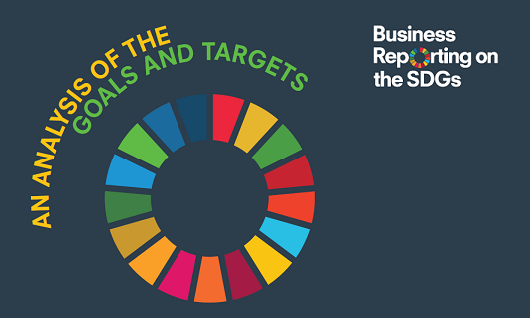Measuring Corporate Actions Against the SDGs

With the 2030 Agenda for Sustainable Development, the world’s leaders set out on an ambitious path to end poverty, fight inequality and injustice, and protect the planet. The 17 Sustainable Development Goals (SDGs) provide a coherent, holistic, integrated framework for addressing the world’s most urgent sustainability challenges and creating a better future for all. The success of the agenda will be based on collaborative efforts by all parties in society, including businesses.
The SDGs have enormous potential to drive corporate action and reporting. With transparency becoming the new paradigm for conducting business, this is the moment to take sustainability reporting to the next level and show the impact of business on the world’s top priorities.
GRI and the UN Global Compact released in September 2017 a publication An Analysis of the Goals and Targets, which aims to aid progress towards these global top priorities by helping businesses large or small, all over the world, improve their reporting and performance on the SDGs. The publication is an inventory of possible disclosures per SDG, at the level of the 169 targets. Any business can use these disclosures to report on their efforts towards achieving the SDGs.
Greater transparency leads to better performance
To increase understanding, the disclosures in the publication are linked to an illustrative menu of potential actions businesses can take to contribute to the SDGs. In cases where there are no relevant disclosures for particular targets, the gaps are highlighed, signaling areas where new disclosures need to be developed. As such, this Analysis is the first step towards the greater ambition to develop a harmonized set of disclosures for businesses to report on the SDGs.
This publication is primarily intended to be used in combination with the document A Practical Guide to Defining Priorities and Reporting, to be released later this year. This second publication takes the SDG Compass as a starting point and offers a structured approach to help companies choose which targets to report on and how to use their reporting to drive action. These two publications are meant to be used together as part of a company’s regular reporting cycle. Companies can use them to disclose their impacts on and contributions to the SDGs, for example through reporting according to the GRI Sustainability Reporting Standards and/or the Communication on Progress (COP) on the UN Global Compact Ten Principles and the SDGs.
Interested in knowing more? Download the publication here. For more updates from GRI, you can subscribe to the monthly newsletter.

